- Home
- Pat Barker
The Women of Troy: A Novel Page 23
The Women of Troy: A Novel Read online
Page 23
I left Andromache at the door of the women’s hut. The air was oppressively humid, and yet to me it didn’t feel like thunder. Normally, before a storm breaks there’s a period of threatening stillness, but there was no stillness that night: just the same constant moaning of a wind that couldn’t rest, and wouldn’t let anybody else rest either. I was glad to go inside and shut the door.
Alcimus came in an hour later. “Agamemnon’s called an assembly,” he said. “Tomorrow, at noon.” He sat down on the bed and began unbuckling his sandals. “I suppose it’s surprising he hasn’t done it before.”
Remembering Agamemnon’s ravaged face, I wondered if he’d been in any state to take decisions. “Isn’t that a good thing?”
“If it brings people together, yes. But the risk is, it’ll just make the divisions public.”
“Aren’t they public already? I mean, Agamemnon didn’t come to the feast.”
“Well, he couldn’t really, could he, with Menelaus there? Can you imagine him sitting there, with Menelaus announcing the marriage? She was supposed to marry his son.”
“Poor girl,” I said.
He looked blank. He’d thrown his tunic off now. As I bent to pick it up, he caught my arm. “Are you all right?”
“I’m fine.”
He let go of me, but perhaps reluctantly. For a moment it had seemed briefly, infinitesimally, possible that we might spend the night together. I felt suddenly that I had to speak, say something, anything…“Do you regret marrying me?”
“Why would I regret it?”
“It wasn’t your choice.”
“But I’m married to the second-most-beautiful woman in the world—how could I possibly regret that?”
What sort of man gazes deep into his wife’s eyes and tells her she’s the second-most-beautiful woman in the world? Well, Alcimus, of course. You mightn’t always like what he said, but you could be fairly certain it was the truth as he saw it. I don’t think I’ve ever known a more honest man. And, of course, that’s why Achilles chose him. I remember Achilles saying he hated the man who thought one thing and said another “as he hated the gates of death.” Well, nobody could ever have accused Alcimus of that.
He was still sitting on the edge of the bed, apparently trying to think of something else to say. “I was pleased you came to see the race.”
“I enjoyed it.”
And that was that. I turned at the door and looked back, but he was already pulling up the sheets, so I picked up a candle and took my second-best beauty off to bed.
* * *
——————
A narrow bed, and hard. Alcimus’s bed was bigger, but no bed could ever be wide enough, as long as Achilles lay between us.
Great Achilles. Brilliant Achilles, shining Achilles, godlike Achilles…
We lived our lives in that vast shadow. That’s what was wrong with my marriage—and I saw no way of putting it right. Perhaps after the baby was born Alcimus might see me simply as a woman? Or acquire some faith in himself; faith that he was not always and irredeemably second best? Perhaps.
The crux was that Alcimus believed—or rather assumed—that I’d loved Achilles, and still loved him. He certainly wasn’t alone in that belief. Then—and now—people seem to take it for granted that I loved Achilles. Why wouldn’t I? I had the fastest, strongest, bravest, most beautiful man of his generation in my bed—how could I not love him?
He killed my brothers.
We women are peculiar creatures. We tend not to love those who murder our families.
But there’s another dimension to this and from my point of view a much less comfortable one. The night Priam came to the Greek camp, to ask Achilles to give him Hector’s body, I hid in his cart as it trundled to the gate, aware all the time of Achilles walking beside it. I could have stayed in the cart, I could have gone all the way to Troy, but then I’d have been facing the sack of another city, a second enslavement. There were good reasons to abandon my attempt to escape, but when Achilles asked why I’d come back I said, simply: I don’t know. And he just nodded. Because the extraordinary thing is that he’d known all along what I was doing—and he’d done nothing to stop me. I came back. He’d been prepared to let me go. So, when we met again, it was no longer, in any simple sense, a relationship between owner and slave. Some of the ties that bind people together are deeper than love. Though if you wanted to be cynical you could say that right from the start I’d been determined to survive and that I knew my chances were better in the Greek camp, under Achilles’s protection, than they would ever have been in Troy.
Where did all this thinking get me? Nowhere. Still lying in a narrow bed listening to the wind, aware of the cradle that was just beginning to rock. In my early days in the camp I’d sometimes prayed for things to change. I didn’t pray for that now. There was no need; the growing baby would bring change enough and, good or bad, there’d be no hope of stopping it. You might as well have tried to hold back the tide.
30
The wind blew at gale force all night. At noon, as each group of men entered the arena, they were faced with visible signs of storm damage. The statue of Artemis, which from its position in the circle was the most exposed of all the gods, had toppled over in the night, forcing the fighters to climb over it, or—out of some confused sense of respect—to go the long way round. Its fall was not entirely unexpected: for months now, it had been leaning away from the wind, rather like the warped trees on the headland. Nevertheless, in the sallow light, its fall appeared ominous; I saw more than one man make the sign against the evil eye as he shuffled past.
I was on my way to Lord Nestor’s hall, hoping to watch the assembly from his veranda. By the time I arrived, Nestor had already left. I saw him making his way through the crowd, leaning heavily on his two older sons, taking his arms from their shoulders only long enough to acknowledge the cheers of the crowd. Hecamede greeted me at the door. As I stepped over the threshold, I smelled burnt sugar and sweet cinnamon. There were so many trays lined up on the long tables in the hall, I thought she must have been baking all morning. Not long afterwards, Cassandra arrived, attended by Ritsa, I was glad to see—though I didn’t like the way Cassandra treated her. I sensed that a complex relationship had grown up between them. Ritsa had witnessed the worst moments of Cassandra’s madness, had helped and supported her through them, and this made her somebody Cassandra depended on, but also resented—and even feared. Ritsa knew too much, had seen too much. When I saw how roughly Cassandra ordered her about, how contemptuous she sometimes seemed, it made me frightened for Ritsa—and it certainly didn’t improve my opinion of Cassandra. I noticed she took sweetmeats from Hecamede’s tray with barely a word of acknowledgement, and I reacted by thanking Hecamede so effusively she took a step back in surprise.
After a few minutes’ stilted conversation, we carried our plates onto the veranda. The arena was filling up fast. Whenever one of the kings entered, there were ragged cheers from his followers, rising to a roar as he took his seat. Eventually all were present, and every eye turned towards Agamemnon’s empty chair. He arrived last at every assembly, his entrance always formal, always dramatic, preceded by heralds and accompanied by a fanfare of trumpets. Leaning over the rail, I could see how old and ill he looked, though his dress was splendid, his manner imperious, and I doubt if many people saw beyond that. You’ve got to remember I’d seen Agamemnon at very close quarters. Too close. Sometimes, at night, I still felt his sweating bulk on top of me.
Ritsa touched my arm. “Are you all right?” I put my hand over hers, but didn’t speak.
I watched the greetings. Odysseus and Diomedes walked across the arena to meet Agamemnon, who then, in a rare moment of grace, heaved himself to his feet and went to speak to Nestor. What was conspicuously absent was any greeting between the two brothers. Menelaus, whether deliberately or not, was always looking the
other way. Pyrrhus was sitting directly opposite Agamemnon, too far away for easy contact, but it would have been natural for Agamemnon to acknowledge him in some way—he’d presented him with first prize in the chariot race only two days before—but I saw no sign of it. Little Ajax was nibbling his beard—a bit scraggy at the best of times—and glancing nervously from side to side. He’d raped Cassandra in the temple of Athena, and here he was, tethered like a goat selected for sacrifice. He greeted nobody—and it was striking how few people greeted him.
At last, Agamemnon stood up and cleared his throat, gazing around the assembly with his sombre, heavy-lidded eyes. “By now,” he said, “we should all be home.” With those few words he caught the attention of every man there. “Even you, Idomeneus, given a fair wind, should have been at home with your dear wife and children. Even Odysseus would have reached faraway Ithaca by now. Yet, here we still are, prevented from leaving by the will of the gods. And we don’t even know what it is we’ve done to offend.”
Really? I thought.
“But it’s in the nature of the gods that punishment often precedes knowledge of the offence. So, I have asked Calchas, a renowned seer who has often in times past guided our counsels, to speak to us again today. To all of you, I would simply say: listen carefully. Ponder his words.”
Calchas, in full priestly regalia with the scarlet bands of Apollo fluttering from his staff, emerged from between two rows of huts. Immediately the buzz that had followed Agamemnon’s speech subsided. He was a familiar figure in the arena, not much liked, perhaps, sometimes sniggered at—but nevertheless, as a seer, respected. Many of those present would remember that when the camp had been visited by plague, he’d spoken out against Agamemnon, saying it was his disrespectful treatment of a priest that had provoked Apollo’s anger and caused him to send his plague arrows flying into the camp, killing beasts and men alike. Agamemnon had hated Calchas for it, but he’d been right, hadn’t he? As soon as Agamemnon sent the priest’s daughter back to her father, there hadn’t been a single new case of the plague—and there were some miraculous cures of men already infected. He’d stood up to Agamemnon then, he’d told the truth. So, they were prepared to listen to him now.
But Calchas didn’t ask them to listen.
“Look,” he said, “look at the statues of the gods.”
All over the assembly, heads turned.
“They’ve been here for ten years—as long as any of you. One of the first things Lord Agamemnon did after the ships disembarked was to order the clearing of a space where the gods might be honoured; these statues were carved and raised and ever since then all debates in the army and between the various kings have taken place under their gaze. We’ve all grown used to their presence. Perhaps you walk across the arena and never look at them. Two days ago, the boxing tournament was held here, and before that, the wrestling, but how many of you bothered to look up at the gods? How many of you noticed how faded and decayed their statues have become? Last night, the statue of Artemis blew over in the gale. Many of you will have stepped over it to get to your places in the assembly. It’s a shock, isn’t it? That gap in the circle—and yet the base of her statue must have been rotting for years.”
Like everybody else, I looked at the statues: flaking paint, rotting wood, Poseidon’s nose missing, Athena’s owl-like eyes dimmed, Apollo tilting dangerously to one side, as if bending in concern over his fallen sister.
“Now, I’m not saying the neglect of their statues has so incensed the gods that they’ve sent this wind as a punishment. I’m saying that the neglect of the statues is a sign of a much greater offence: a failure of the respect we all owe to beings so much greater than ourselves.”
Calchas was sweating in the heat, his face paint flaking, the dark lines round his eyes beginning to run—that, and his immense height, made him look like a decaying statue himself. A sort of thirteenth god.
“Friends,” he said. “We all know that when a great city falls, things are done which in an ideal world would not happen. It’s nobody’s fault—I’m not blaming anybody. The harsh necessity of war, which the gods themselves have imposed on the Greeks, makes such actions inevitable—but still, the facts remain. The temples of the gods were desecrated. Women who’d taken shelter behind the altars were dragged out and raped. Even virgin priestesses were not spared.”
Calchas was careful not to look at Ajax, but everybody else turned in his direction. I was suddenly aware of Cassandra standing beside me; glancing down, I saw the whiteness of her knuckles as she gripped the rail.
“And then,” Calchas continued, “the temples were set on fire. Many of them burned to the ground. Is there anyone among you who can say this was not a cause of deep offence? But the gods are merciful. They don’t require the rebuilding of their temples. They’ll be content if their statues are repaired and the kings make sacrifices in front of them—after every man in the camp has purified himself.”
That was the lightest of light punishments. A team of skilled carpenters—and there were many such in the camp—could repair the statues in a week. Ajax looked relieved—as well he might—and there was a general stir, an easing of tension.
But Calchas hadn’t moved. He waited for his audience to settle again, and then said: “In revealing the will of the gods, I run the risk of offending a great leader, a man pre-eminent for his courage and skill in fighting.” He turned to Agamemnon. “I must ask for your protection, Lord Agamemnon.”
Agamemnon raised his hand. “You have it. Speak without fear, as the gods direct.”
“Friends,” Calchas said, again. (Did he have a single friend in that whole vast assembly? I doubted it.) “Friends. We all know that Zeus in his mercy gave laws to mankind that a wise man will be careful to obey, if he wishes to see his children and grandchildren prosper. Above all, Zeus gave us the laws of hospitality, guest-friendship, the sacred tie that binds host and guest together—for life. And we also know that this bond, once forged, overrides all other loyalties. Guest-friends are not permitted to kill each other, even if they’re fighting on opposite sides in a war. Some of you will remember that Diomedes encountered his grandfather’s guest-friend on the battlefield and very properly refused to fight him. Nobody blamed Diomedes for walking away from that encounter, because the killing of a guest-friend is never justified, not even in a war.”
The assembly had gone very quiet. They couldn’t see where this was leading. Diomedes had been mentioned, but only to be exonerated. Ajax, everybody’s favourite for the role of chief offender, seemed to be off the hook…“Now I come to the difficult part,” Calchas said. “You all know that when great Achilles walked among us, he killed Hector, the son of Priam, and so great was his desire for revenge that he dragged Hector’s body back to the camp, inflicting countless injuries upon it. King Priam came to Achilles by night, alone, and was received by him with every mark of courtesy and respect. When Priam left the camp, with Hector’s body in his cart, Achilles saw him to the gate, fully armed, and prepared to defend him even against his fellow Greeks. There is no possible doubt that the bond of guest-friendship had been forged between them. That bond descended to Achilles’s son, Lord Pyrrhus, who killed Priam on the altar of Zeus in Troy. He killed his father’s guest-friend on the altar of Zeus, the god who gave mankind the laws of hospitality.
“Could there be any greater insult to the god than that? My friends, it’s Zeus himself, the father of gods and men, who keeps us imprisoned on this beach.”
All eyes were on Pyrrhus now. He looked bewildered, staring blankly from side to side. It was obvious he hadn’t thought for a moment that this might be the outcome of the assembly. I saw Automedon lean forward and put a steadying hand on his shoulder.
Calchas went on, “Now you may say Lord Pyrrhus didn’t know of the bond between his father and Priam, and that may well be true, but an offence committed in ignorance is still an offence. So now I come to
the punishment that Zeus demands. Priam must be buried with all the honours due to a king, but before the pyre is lit Lord Pyrrhus must sacrifice his black stallion, one of the team he was driving when he won the chariot race.”
Pyrrhus leapt to his feet. “NO! No—you stinking heap of dogshit, I’ll see you in hell first.”
Alcimus put out a hand to restrain him. Pushing him aside, Pyrrhus hurled himself across the arena, pulling his sword as he went. Agamemnon’s guards were rushing forward to protect Calchas, who shrank back against the statue of Zeus with both arms raised to protect his face. At the last moment, Pyrrhus seemed to hesitate, long enough for Automedon to grab him by the hair and yank his head back. Alcimus stepped in front of Calchas, holding up his hands to show he was unarmed, and at a word from Agamemnon, the guards fell back. By now, the Myrmidons were closing around Pyrrhus, who had to suffer the humiliation of being disarmed by his own men and dragged away.
Uproar. All over the arena, men were out of their seats, waving their arms and shouting. Agamemnon called for order several times before he managed to make himself heard. When the assembly was finally quiet, he thanked Calchas for his words of wisdom, said that Pyrrhus was understandably upset—he was a very young man and, as they all knew, young men lacked judgement and had to be guided by those who were older and wiser…And so on. He was sure that when Lord Pyrrhus had had time to reflect, he would see sense—and obey the gods.
And with that, Agamemnon’s procession re-formed and left the arena, leaving Menelaus to contemplate the fact that his sole remaining ally in the camp, the man to whom he’d just promised his daughter’s hand in marriage, was in disgrace. Meanwhile, the Myrmidons, in total disarray, moved off in a great huddle with Pyrrhus’s red hair at the centre, almost as if they were carrying a wounded comrade from the battlefield. I went back inside the hall, sat at one end of a bench and rested my arms on the table. Cassandra, who’d followed me in, sat opposite.

 Border Crossing
Border Crossing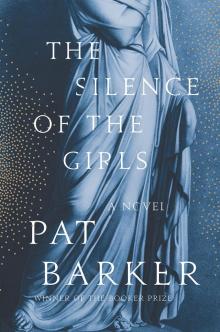 The Silence of the Girls
The Silence of the Girls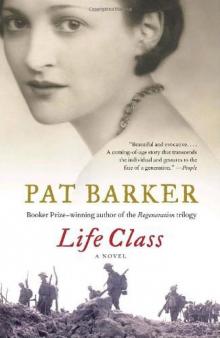 Life Class
Life Class Regeneration
Regeneration Another World
Another World The Ghost Road
The Ghost Road Double Vision
Double Vision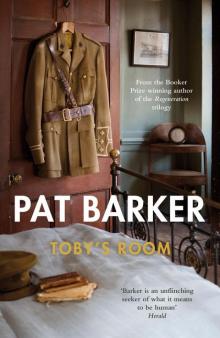 Toby's Room
Toby's Room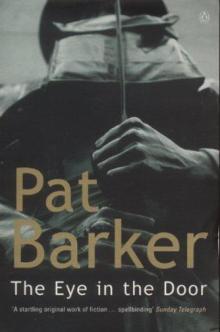 Regeneration Trilogy 02 - The Eye in the Door
Regeneration Trilogy 02 - The Eye in the Door The Eye in the Door
The Eye in the Door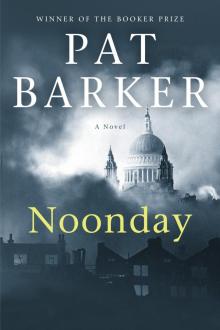 Noonday
Noonday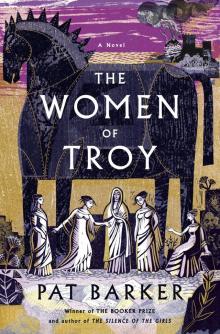 The Women of Troy: A Novel
The Women of Troy: A Novel